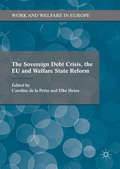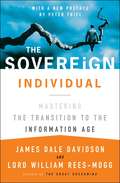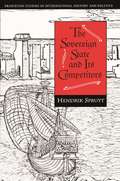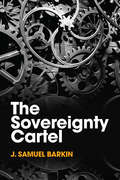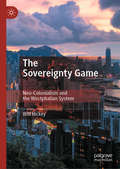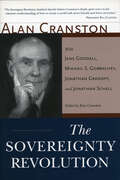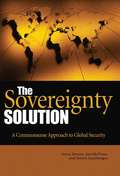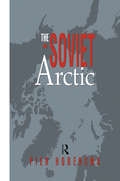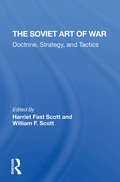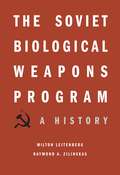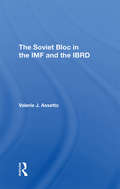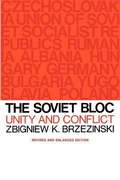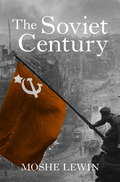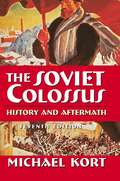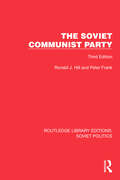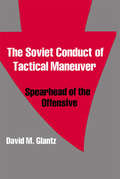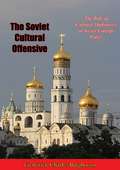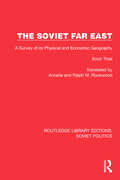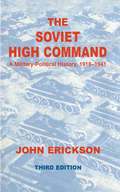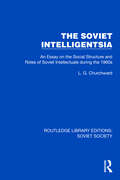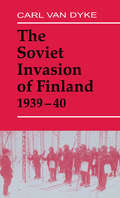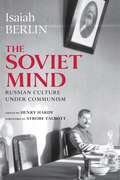- Table View
- List View
The Sovereign Debt Crisis, the EU and Welfare State Reform
by Caroline Porte Elke HeinsThis book offers a much-needed analysis of how the European Union (EU) has affected welfare state reforms in the Member States most severely hit by the 2008 economic crisis. Bringing together leading European social policy researchers, it shows that the EU's responses to the sovereign debt crisis have changed the nature of EU intervention into domestic welfare states, with an enhanced focus on fiscal consolidation, increased surveillance and enforcement of EU measures. The authors demonstrate how this represents an unprecedented degree of EU involvement in domestic social and labour market policies. Readers will also discover how greater demands to attain balanced budgets have been institutionalized, leading to tensions with the EU's social investment strategy. This highly informative edited collection will engage students, social policy practitioners and researchers, scholars of the welfare state and political scientists.
The Sovereign Individual: Mastering the Transition to the Information Age
by James Dale Davidson Lord William Rees-MoggNow featuring a new preface by Peter Thiel Two renowned investment advisors and authors of the bestseller The Great Reckoning bring to light both currents of disaster and the potential for prosperity and renewal in the face of radical changes in human history as we move into the next century. The Sovereign Individual details strategies necessary for adapting financially to the next phase of Western civilization. Few observers of the late twentieth century have their fingers so presciently on the pulse of the global political and economic realignment ushering in the new millennium as do James Dale Davidson and Lord William Rees-Mogg. Their bold prediction of disaster on Wall Street in Blood in the Streets was borne out by Black Tuesday. In their ensuing bestseller, The Great Reckoning, published just weeks before the coup attempt against Gorbachev, they analyzed the pending collapse of the Soviet Union and foretold the civil war in Yugoslavia and other events that have proved to be among the most searing developments of the past few years. In The Sovereign Individual, Davidson and Rees-Mogg explore the greatest economic and political transition in centuries—the shift from an industrial to an information-based society. This transition, which they have termed "the fourth stage of human society," will liberate individuals as never before, irrevocably altering the power of government. This outstanding book will replace false hopes and fictions with new understanding and clarified values.
The Sovereign State and Its Competitors: An Analysis of Systems Change (Princeton Studies in International History and Politics #176)
by Hendrik SpruytThe present international system, composed for the most part of sovereign, territorial states, is often viewed as the inevitable outcome of historical development. Hendrik Spruyt argues that there was nothing inevitable about the rise of the state system, however. Examining the competing institutions that arose during the decline of feudalism--among them urban leagues, independent communes, city states, and sovereign monarchies--Spruyt disposes of the familiar claim that the superior size and war-making ability of the sovereign nation-state made it the natural successor to the feudal system. The author argues that feudalism did not give way to any single successor institution in simple linear fashion. Instead, individuals created a variety of institutional forms, such as the sovereign, territorial state in France, the Hanseatic League, and the Italian city-states, in reaction to a dramatic change in the medieval economic environment. Only in a subsequent selective phase of institutional evolution did sovereign, territorial authority prove to have significant institutional advantages over its rivals. Sovereign authority proved to be more successful in organizing domestic society and structuring external affairs. Spruyt's interdisciplinary approach not only has important implications for change in the state system in our time, but also presents a novel analysis of the general dynamics of institutional change.
The Sovereignty Cartel
by J. Samuel BarkinSovereignty is the subject of many debates in international relations. Is it the source of state authority or a description of it? What is its history? Is it strengthening or weakening? Is it changing, and how? This book addresses these questions, but focuses on one less frequently addressed: what makes state sovereignty possible? The Sovereignty Cartel argues that sovereignty is built on state collusion – states work together to privilege sovereignty in global politics, because they benefit from sovereignty's exclusivity. This book explores this collusive behavior in international law, international political economy, international security, and migration and citizenship. In all these areas, states accord rights to other states, regardless of relative power, relative wealth, or relative position. Sovereignty, as a (changing) set of property rights for which states collude, accounts for this behavior not as anomaly (as other theories would) but instead as fundamental to the sovereign states system.
The Sovereignty Game: Neo-Colonialism and the Westphalian System
by Will HickeyThis book explores the change and continuity in the idea of the nation state. Since the Westphalian treaties and the political thought of Thomas Hobbes, the nation state has been the denominator of all geopolitics. In an era of populism, economic globalization, digitalization, and the Chinese party-state, scholars of sovereignty have been struggling to understand whether the nation-state remains relevant as a necessary heuristic. This book will be of interest to scholars, policymakers, investors, and citizens navigating a fast-changing world.
The Sovereignty Revolution
by Alan CranstonThe Sovereignty Revolution is the late Senator Alan Cranston's analysis of the problems created by our current conception of sovereignty, "with every nation supreme inside its own borders and acknowledging no master outside them." As such, it is the last testament of a senior statesman with a deep moral commitment to nuclear disarmament. This book is an impassioned argument that these conceptions of sovereignty, and in turn the role of international institutions, must change before humanity can effectively resolve the world's increasingly global challenges, from international terrorism and the proliferation of nuclear weapons to climate change and poverty. Cranston argues that for humanity to survive the twenty-first century, we must adopt a more encompassing understanding of sovereignty, one that acknowledges the primacy of the individual, while emphasizing the importance of strengthening international law and increasing the authority of multilateral institutions, such as the United Nations. The book includes a foreword by Mikhail Gorbachev, an Introduction by Jonathan Schell, and response essays by Jane Goodall and Jonathan Granoff.
The Sovereignty Solution
by Joe Mcgraw Anna Simmons Duane LauchengcoThe Sovereignty Solution is not an Establishment national security strategy. Instead, it describes what the U.S. could actually do to restore order to the world without having to engage in either global policing or nation-building. Currently there is no coherent plan that addresses questions like: If terrorists were to strike Chicago tomorrow, what would we do? When Chicago is burning, whom would we target? How would we respond? There is nothing in place and no strategy on the horizon to either reassure the American public or warn the world: attack us, and this is what you can expect. In this book, a Naval Postgraduate School professor and her Special Forces coauthors offer a radical yet commonsensical approach to recalibrating global security. Their book discusses what the United States could actually do to restore order to the world without having to engage in either global policing or nation-building. Two tracks to their strategy are presented: strengthening state responsibility abroad and strengthening the social fabric at home. The authors' goal is to provoke a serious debate that addresses the gaps and disconnects between what the United States says and what it does, how it wants to be perceived, and how it is perceived. Without leaning left or right, they hope to draw many people into the debate and force Washington to rethink what it sends service men and women abroad to do.
The Soviet Arctic
by Pier HorensmaThe Soviet Arctic is the first book to consider Soviet policy in this area from an historian's point of view. Horensma assesses the importance of historic legacies to current Soviet Arctic policy and their consequences on an international level. The book also discusses the significance of historic precedents in the determination of polar sovereignty.
The Soviet Art Of War: Doctrine, Strategy, And Tactics
by Harriet Fast Scott William F. ScottNo other nation has invested as much intellectual capital in the study of war as has the Soviet Union over the last six decades, and the doctrine, strategy, and tactics that have been developed by Soviet theoreticians are bound to guide any future Soviet military action. The Soviet Art of War makes available to Western readers selections from the most significant and influential Soviet military writings from 1917 to the present. The Scotts have examined thousands of Soviet military publications, including the restricted journal of the Soviet General Staff, Voyennaya Mysl', to make this book the most comprehensive account of Soviet military theory and practice yet published. The papers they have chosen thoroughly illustrate the development of the basic features of Soviet military art, from the days of trench warfare to the era of the nuclear battlefield. These documents demonstrate the emphasis on surprise, on deception, on mass deep penetration of enemy defenses, and on a unified strategy for all services. They also show the forms of military action—destruction and attrition, defense and offense, maneuver and position-as seen through the eyes of leading Soviet marshals, generals, and admirals. The usefulness of this material is further enhanced by the Scotts' commentary and their analysis of each group of readings.
The Soviet Biological Weapons Program
by Milton Leitenberg Raymond A. Zilinskas Jens H. KuhnRussian officials claim today that the UR never possessed an offensive biological weapons program. In fact, the Soviet government spent billions of rubles and hard currency to fund a hugely expensive weapons program that added nothing to the country’s security. This history is the first attempt to understand the broad scope of the UR’s offensive biological weapons research-its inception in the 1920s, its growth between 1970 and 1990, and its possible remnants in present-day Russia. We learn that the U. S. and U. K. governments never obtained clear evidence of the program’s closure from 1990 to the present day, raising the critical question whether the means for waging biological warfare could be resurrected in Russia in the future. Based on interviews with important Soviet scientists and managers, papers from the Soviet Central Committee, and U. S. and U. K. declassified documents, this book peels back layers of lies, to reveal how and why Soviet leaders decided to develop biological weapons, the scientific resources they dedicated to this task, and the multitude of research institutes that applied themselves to its fulfillment. We learn that Biopreparat, an ostensibly civilian organization, was established to manage a top secret program, code-named Ferment, whose objective was to apply genetic engineering to develop strains of pathogenic agents that had never existed in nature. Leitenberg and Zilinskas consider the performance of the U. S. intelligence community in discovering and assessing these activities, and they examine in detail the crucial years 1985 to 1992, when Mikhail Gorbachev’s attempts to put an end to the program were thwarted as they were under Yeltsin.
The Soviet Biological Weapons Program: A History
by Milton Leitenberg Raymond A Zilinskas Jens H KuhnThis is the first attempt to understand the full scope of the USSR’s offensive biological weapons research, from inception in the 1920s. Gorbachev tried to end the program, but the U.S. and U.K. never obtained clear evidence that he succeeded, raising the question whether the means for waging biological warfare could be present in Russia today.
The Soviet Bloc In The Imf And The Ibrd
by Valerie J AssettoIn this book, the author surveys performance of the Soviet Bloc states in the International Monetary Fund (IMF) and the International Bank for Reconstruction and Development (IBRD) for evidence of unusual levels of assistance using aggregate data obtained from IMF and IBRD sources.
The Soviet Bloc: Unity and Conflict
by Zbigniew BrzezinskiThis book by the distinguished diplomat Zbigniew Brzezinski describes the relations between the Soviet Union, and the Eastern European and the Asian Communist nations as they emerged from World War II, then were unified by Stalin, and evolved toward a looser alliance in the mid-1960s. As would be expected, this book includes many Slavic names and words, especially in the numerous footnotes and endnotes.
The Soviet Century
by Moshe LewinOn the centenary of the Russian Revolution, a classic history of the Soviet era, from 1917 to its fallOne hundred years after the Russian Revolution the Soviet Union remains the most extraordinary, yet tragic, attempt to create a society beyond capitalism. Yet its history was one that for a long time proved impossible to write.In The Soviet Century, Moshe Lewin follows this history in all its complexity, guiding us through the inner workings of a system which is still barely understood. In the process he overturns widely held beliefs about the USSR's leaders, the State-Party system and the powerful Soviet bureaucracy.Departing from a simple linear history, The Soviet Century traces all the continuities and ruptures that led from the founding revolution of October 1917 to the final collapse of the late 1980s and early 1990s, passing through the Stalinist dictatorship, the impossible reforms of the Khrushchev years and the glasnost and perestroika policies of Gorbachev.From the Trade Paperback edition.
The Soviet Colossus: History and Aftermath
by Michael KortThe twentieth century was not kind to Russia. Despite its great potential and remarkable achievements, the country also bore the weight of two world wars, a revolution and civil war, totalitarian tyranny, famine and ecological destruction, economic ruin, and imperial decline. Will Russia ever be prosperous, peaceful, and free? Seeking clues in the past, Michael Kort revisits earlier turning points in Russia's history--from the fall of the old regime to the establishment of the Bolshevik dictatorship and Stalinist totalitarianism; from the reforms and counter-reforms of Khrushchev and Brezhnev to the tumultuous years of change under Gorbachev and Yeltsin. Which strands of Russia's past is their successor, Vladimir Putin, weaving into the fabric of the present, and which are being allowed to fade, for better or worse? This new edition of The Soviet Colossus brings the story up through the first decade of the twenty-first century. Distinctively readable, judicious, and focused on critical events and questions, it integrates new revelations about the Soviet past and ongoing debates about the Soviet regime as well as its successor. It is the ideal text for as one semester history course or background for a political science course.
The Soviet Communist Party: Third Edition (Routledge Library Editions: Soviet Politics)
by Peter Frank Ronald J. HillThe Soviet Communist Party (1986) provides a concise and accessible description, analysis and assessment of the Communist Party of the Soviet Union (CPSU) and its place in the Soviet political system. It covers the Party’s structures, membership, personnel and functions, and relations with the state institutions, and discusses the Party’s role in leading other institutions and the press, and the part it plays in foreign relations. The book concludes with an examination of the CPSU in terms of a number of concepts that have been applied to it – as an elite, a class, a ‘totalitarian leader’s following’.
The Soviet Conduct of Tactical Maneuver: Spearhead of the Offensive (Soviet (Russian) Military Theory and Practice)
by David GlantzFirst Published in 1991. Routledge is an imprint of Taylor & Francis, an informa company.
The Soviet Cultural Offensive: The Role of Cultural Diplomacy in Soviet Foreign Policy
by Frederick Charles BarghoornIMPORTANT techniques of Soviet foreign policy still remain almost unexamined. One of these is the complex amalgam of propaganda, deception, and sometimes mutually profitable transactions with non-Soviet states that is herein described as Cultural Diplomacy. Soviet Cultural Diplomacy represents what from a non-communist point of view usually seems to be a perversion of cultural exchange and intercultural communication.This is an effort to project to all men an image of the Soviet way of life calculated to facilitate Soviet foreign policy objectives. It is accompanied by an equally massive effort to shield the Kremlin’s subjects from harmful “alien” influences. It has almost nothing in common with democratic ideals of free intellectual communion. However, we live in an age when increased freedom of international communication, contacts, and travel is necessary for world welfare. Premier Khrushchev’s cancellation of his invitation to President Eisenhower for a visit to Russia underscored Soviet determination to prevent even previously agreed upon contacts if they appeared to threaten, however indirectly, the Kremlin’s absolute control over the thinking of the Soviet people. Nevertheless, there is every reason to believe that over the long run communists will make increasing use of the international propaganda procedures described in this study. While guarding against the perils inherent in communist duplicity, we should welcome the opportunities offered by exchanges of persons with Soviet Bloc countries to dissolve prejudices and facilitate whatever limited cooperation is possible between representatives of rival ways of life.
The Soviet Far East: A Survey of its Physical and Economic Geography (Routledge Library Editions: Soviet Politics)
by Erich ThielThe Soviet Far East (1957) examines the Soviet economic and political development of the Russian Far East between Lake Baikal and the Pacific, as it gained importance as the geographic base of Soviet power in the Far Eastern theatre of international politics and strategy.
The Soviet High Command: A Military Political History, 1918-1941
by John EricksonAn objective and documentary history of the earliest origins and formative years of the Workers-Peasants Red Army from the Civil War to the initial disasters of the war with Germany, the Great Patriotic War, culminating in the "battle for Moscow" in November-December 1941.
The Soviet Intelligentsia: An Essay on the Social Structure and Roles of Soviet Intellectuals in the 1960s (Routledge Library Editions: Soviet Society)
by L.G. ChurchwardThe Soviet Intelligentsia (1973) is a valuable study of the composition and structure of the Soviet intelligentsia during the 1960s. It focuses in particular on the position of social scientists and the relationship between the intelligentsia and the Communist party. The book contains much original material drawn from Soviet newspapers, books and periodicals, and from the personal experiences of the author in the Soviet Union. It discusses the problem of defining the intelligentsia, their social spread, recruitment and training, as well as Soviet intellectual culture and lifestyles, the social and political roles of the intelligentsia and the likely future of this distinctive group in the Soviet system.
The Soviet Invasion of Finland, 1939-40 (Soviet (Russian) Military Experience #No. 3)
by Carl Van DykeWestern accounts of the Soviet-Finnish war have been reliant on Western sources. Using Russian archival and previously classified secondary sources to document the experience of the Red Army in conflict with Finland, Carl Van Dyke offers a reassessment of the conflict.
The Soviet Mind
by Isaiah Berlin Henry Hardy Strobe TalbottIsaiah Berlin's response to the Soviet Union was central to his identity, both personally and intellectually. Born a Russian subject in Riga in 1909, he spoke Russian as a child and witnessed both revolutions in St. Petersburg in 1917, emigrating to the West in 1921. He first returned to Russia in 1945, when he met the writers Anna Akhmatova and Boris Pasternak. These formative encounters helped shape his later work, especially his defense of political freedom and his studies of pre-Soviet Russian thinkers. Never before collected, Berlin's writings about the USSR include his accounts of his famous meetings with Russian writers shortly after the Second World War; the celebrated 1945 Foreign Office memorandum on the state of the arts under Stalin; his account of Stalin's manipulative 'artificial dialectic'; portraits of Osip Mandel´shtam and Boris Pasternak; his survey of Soviet Russian culture written after a visit in 1956; a postscript stimulated by the events of 1989; and more. This collection includes essays that have never been published before, as well as works that are not widely known because they were published under pseudonyms to protect relatives living in Russia. The contents of this book were discussed at a seminar in Oxford in 2003, held under the auspices of the Brookings Institution. Berlin's editor, Henry Hardy, had prepared the essays for collective publication and here recounts their history. In his foreword, Brookings president Strobe Talbott, an expert on the Soviet Union, relates the essays to Berlin's other work. The Soviet Mind will assume its rightful place among Berlin's works and will prove invaluable for policymakers, students, and those interested in Russian politics, past, present and future.
The Soviet Mind
by Isaiah Berlin Henry Hardy Strobe TalbottIsaiah Berlin's response to the Soviet Union was central to his identity, both personally and intellectually. Born a Russian subject in Riga in 1909, he spoke Russian as a child and witnessed both revolutions in St. Petersburg in 1917, emigrating to the West in 1921. He first returned to Russia in 1945, when he met the writers Anna Akhmatova and Boris Pasternak. These formative encounters helped shape his later work, especially his defense of political freedom and his studies of pre-Soviet Russian thinkers. Never before collected, Berlin's writings about the USSR include his accounts of his famous meetings with Russian writers shortly after the Second World War; the celebrated 1945 Foreign Office memorandum on the state of the arts under Stalin; his account of Stalin's manipulative 'artificial dialectic'; portraits of Osip Mandel´shtam and Boris Pasternak; his survey of Soviet Russian culture written after a visit in 1956; a postscript stimulated by the events of 1989; and more. This collection includes essays that have never been published before, as well as works that are not widely known because they were published under pseudonyms to protect relatives living in Russia. The contents of this book were discussed at a seminar in Oxford in 2003, held under the auspices of the Brookings Institution. Berlin's editor, Henry Hardy, had prepared the essays for collective publication and here recounts their history. In his foreword, Brookings president Strobe Talbott, an expert on the Soviet Union, relates the essays to Berlin's other work. The Soviet Mind will assume its rightful place among Berlin's works and will prove invaluable for policymakers, students, and those interested in Russian politics, past, present and future.
